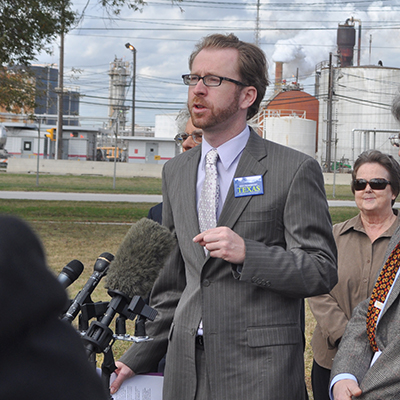
Letter to Chancellor McRaven on UT Methane Emissions
On behalf of Environment Texas and the University of Texas Student Government, we are writing to provide a brief update and request a meeting so we can discuss methane emissions from oil and gas facilities overseen by University Lands and the disappointing stance taken by UL administration.
October 19, 2016
Chancellor William H. McRaven
Office of the Chancellor
The University of Texas System
601 Colorado Street, 4th Floor
Austin, Texas 78701
Chancellor McRaven,
On behalf of Environment Texas and the University of Texas Student Government, we are writing to provide a brief update and request a meeting so we can discuss methane emissions from oil and gas facilities overseen by University Lands and the disappointing stance taken by UL administration.
Climate change is not a new global challenge, nor is the most common greenhouse gas, carbon dioxide. Methane, however, has only recently begun receiving the urgent attention it deserves. Though less prolific than carbon dioxide, methane packs a much more serious climate punch in the short term; it is more than 80 times more powerful a heat trapper than carbon dioxide. With each new study on methane — including research conducted by UT — the need to reduce carbon dioxide and methane is becoming undeniably clear.
The oil and gas industry is the largest source of man-made methane emissions in the United States. On land managed by UL, there are more than 9,000 oil and gas wells. Using EPA data, Environment TExas estimated (calculation method attached) that UL wells emitted more than 11.7 million tons of climate pollution in the form of methane (calculated as tons of CO2e) between 2009 and 2014. Annually, the average for those years has the same short term climate impact as 2.5 million cars or 3.4 coal-fired power plants.
Last month, Environment Texas and the UT Student Government issued a request of both UT and University Lands: as a leader on many climate change issues and a steward of our public land, UL should reduce the amount of methane leaking from the wells on its land. Many departments at UT are working on exciting and promising technologies and policies that will help us reduce climate emissions, and the university rightly promotes its climate change efforts and experts. But methane emissions on UL lands undermines the university’s commitment to sustainability. UT should, in other words, be part of the climate change solution rather than exacerbating the problem.
UL CEO Mark Houser’s response to our request was disappointing. We’re used to having concerns over global warming emissions dismissed as “alarmist” by industry spokespeople, but not by a steward of public lands affiliated with a major research university.
In his response to our methane estimate on UL lands, he appears to have conflated data regarding U.S. methane emissions from all sources with those coming from just the oil and gas sector. This falsely minimizes the issue. He claimed we did not substantiate our data with proper sourcing, yet we provided this information to the press who shared it with UL. Mr. Houser pointed to new federal methane regulations, but failed to mention that these new regulations do nothing to address the thousands of existing wells and facilities on UL lands on which our emission estimate was based.
Finally, he stated that UL goes “above and beyond state and federal regulations because it’s the right thing to do …” Perhaps this is true for some things. But quite clearly, it is not the case for methane emissions. The truth is that reducing methane on UL land is not only technically possible today, it can be done simply and affordably if UL were to require energy companies to use emission control techniques that some responsible companies already do and some states already require.
UT is a leader in so many respects, especially in energy. Reducing methane emissions on UL land is an opportunity for UT to show global leadership, be a premiere steward of its public trust, and to fulfill UL’s pledge to “go above and beyond.” Teaching today’s students to be tomorrow’s clean energy leaders isn’t enough. We need UT to implement climate solutions today that can have immediate and meaningful impact.
We don’t believe Mr. Houser intends to lead on this issue. We hope that UT, which administers University Lands, feels differently, and that together we can find a path forward. We respectfully request the opportunity to sit down with you and discuss this important topic.
Sincerely,
Luke Metzger Ramsey Hashem
Director, Environment Texas Representative, UT Student Government, College of Natural Sciences
Authors
Luke Metzger
Executive Director, Environment Texas
As the executive director of Environment Texas, Luke is a leading voice in the state for clean air and water, parks and wildlife, and a livable climate. Luke recently led the successful campaign to get the Texas Legislature and voters to invest $1 billion to buy land for new state parks. He also helped win permanent protection for the Christmas Mountains of Big Bend; helped compel Exxon, Shell and Chevron Phillips to cut air pollution at four Texas refineries and chemical plants; and got the Austin and Houston school districts to install filters on water fountains to protect children from lead in drinking water. The San Antonio Current has called Luke "long one of the most energetic and dedicated defenders of environmental issues in the state." He has been named one of the "Top Lobbyists for Causes" by Capitol Inside, received the President's Award from the Texas Recreation and Parks Society for his work to protect Texas parks. He is a board member of the Clean Air Force of Central Texas and an advisory board member of the Texas Tech University Masters of Public Administration program. Luke, his wife, son and daughters are working to visit every state park in Texas.

